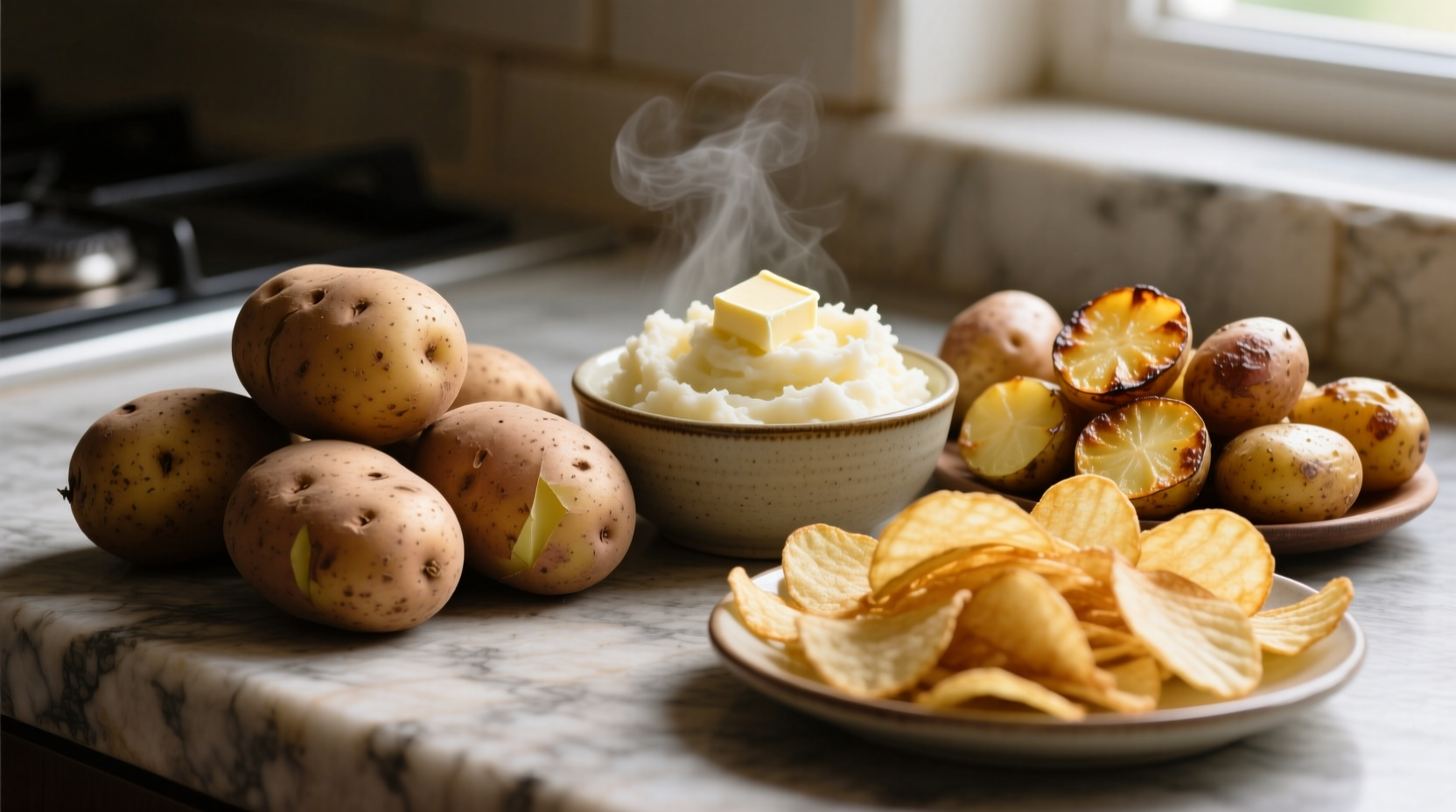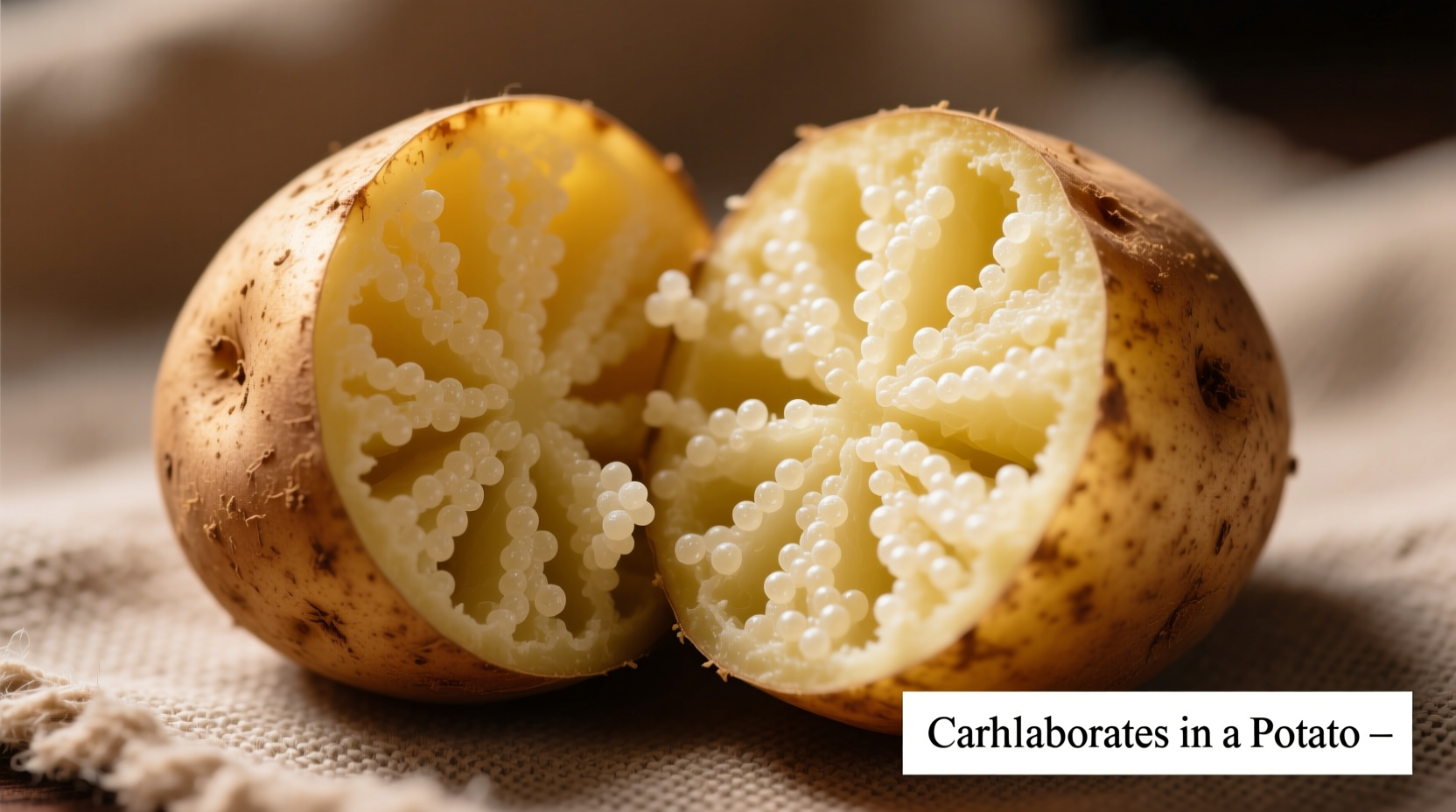Understanding Potato Carbohydrates: What You Need to Know
When you're tracking your carbohydrate intake, understanding what's in your potatoes matters. Potatoes remain one of the world's most consumed vegetables, yet many people misunderstand their carbohydrate profile. Let's break down exactly what carbohydrates you're getting when you serve up this versatile staple.
Breaking Down Potato Carbohydrate Composition
Potatoes contain three main types of carbohydrates, each with different effects on your body. Unlike simple carbohydrate sources, potatoes offer a complex nutritional profile that extends beyond just starch.
| Potato Type | Total Carbs (per 100g raw) | Starch Content | Dietary Fiber | Natural Sugars |
|---|---|---|---|---|
| Russet | 17.5g | 15.4g | 1.3g | 0.6g |
| Yukon Gold | 16.9g | 14.8g | 1.2g | 0.5g |
| Red Potato | 16.5g | 14.4g | 1.4g | 0.4g |
| Sweet Potato | 20.1g | 17.8g | 2.5g | 4.2g |
This comparison of different potato varieties shows how carbohydrate composition varies across common types. Data sourced from the USDA FoodData Central database provides verified nutritional information for accurate dietary planning.
How Cooking Methods Transform Potato Carbohydrates
The way you prepare potatoes significantly impacts their carbohydrate structure and how your body processes them. Understanding these changes helps you make informed choices based on your nutritional goals.
When potatoes cool after cooking, they develop resistant starch—a type of carbohydrate that resists digestion in the small intestine. This transformation occurs through a process called starch retrogradation. Research from the National Center for Biotechnology Information shows that cooled potatoes can contain up to 14% more resistant starch than when served hot.
Consider these practical effects of different cooking techniques:
- Baking: Concentrates carbohydrates as water evaporates, increasing carb density per serving
- Boiling: Causes some starch to leach into cooking water, slightly reducing final carb content
- Frying: Adds significant calories from oil while creating acrylamide compounds at high temperatures
- Cooling after cooking: Increases resistant starch content by 30-50% compared to hot serving

Practical Carbohydrate Management Strategies
Whether you're monitoring blood sugar, managing weight, or optimizing athletic performance, these evidence-based approaches help you work potatoes into your dietary pattern effectively.
For Blood Sugar Management
The glycemic index (GI) of potatoes varies dramatically based on preparation. According to research published in the American Journal of Clinical Nutrition, the GI ranges from 53 (cooled boiled potatoes) to 111 (mashed with butter). Pairing potatoes with protein and healthy fats reduces the glycemic response by 30-40%.
For Weight Management
Potatoes actually rank highest on the Satiety Index developed by scientific researchers—meaning they keep you feeling full longer than many other carbohydrate sources. A medium potato provides about 160 calories with significant potassium and vitamin C.
For Athletic Performance
Endurance athletes often use potatoes as a natural carbohydrate source before events. The Journal of the International Society of Sports Nutrition notes that potatoes provide sustained energy release when consumed 2-3 hours before activity, with fewer digestive issues than many commercial sports products.
Common Misconceptions About Potato Carbohydrates
Several myths persist about potato carbohydrates that deserve clarification based on current nutritional science.
Myth: "Potatoes are just empty carbohydrates with no nutritional value."
Fact: Potatoes provide significant potassium (more than bananas per serving), vitamin C, and B vitamins. The skin contains nearly half the fiber content.
Myth: "All potato carbs turn to sugar quickly in your body."
Fact: While potatoes contain starch that breaks down to glucose, the rate varies significantly by preparation method and what you eat them with. Cooling potatoes increases resistant starch, which functions more like fiber.
Putting Potato Carbohydrates in Context
When evaluating potato carbohydrates, consider how they compare to other common carbohydrate sources in your diet:
- A medium potato contains similar carbohydrates to 1 cup of cooked rice but with more potassium and vitamin C
- Potatoes provide more sustained fullness than white bread despite similar carbohydrate content
- Compared to processed snacks, potatoes offer naturally occurring nutrients without added sugars or preservatives
For individuals following specific dietary patterns like low-carb or diabetic meal plans, understanding portion control is essential. A reasonable serving size is typically 1/2 to 1 cup of cooked potato, providing 15-30g of carbohydrates depending on preparation.
Frequently Asked Questions
How many carbohydrates are in a medium potato?
A medium potato (about 150g) contains approximately 26 grams of carbohydrates. This includes 23 grams of starch, 2 grams of dietary fiber, and 1 gram of natural sugars. The exact count varies slightly by potato variety and cooking method.
Do potatoes have more carbohydrates than rice?
A cooked 100g serving of white rice contains about 28g of carbohydrates, while the same amount of potato contains approximately 17g. However, potatoes are more filling due to higher water and fiber content, so you typically eat smaller portions.
Are potato carbohydrates bad for blood sugar?
Potatoes can affect blood sugar, but the impact varies significantly. Cooling potatoes after cooking increases resistant starch, lowering the glycemic response. Pairing potatoes with protein, healthy fats, and vinegar can reduce blood sugar spikes by up to 40% compared to eating them alone.
Which potato variety has the lowest carbohydrate content?
Among common varieties, red potatoes typically have slightly fewer carbohydrates than Russets. However, the difference is minimal (about 0.5g per 100g). Sweet potatoes contain more total carbohydrates but have a lower glycemic index due to higher fiber content.
Does boiling potatoes remove carbohydrates?
Boiling causes some starch to leach into the cooking water, reducing the final carbohydrate content by approximately 5-10% compared to baking. However, most carbohydrates remain in the potato. The water-soluble nutrients like vitamin C also decrease with boiling.











 浙公网安备
33010002000092号
浙公网安备
33010002000092号 浙B2-20120091-4
浙B2-20120091-4